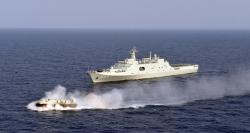Iraq Puts Mosul Offensive On Hold
The Iraqi army’s effort to retake the northern city of Mosul from ISIS has been put on hold. The first phase of the campaign to liberate Mosul is running into difficulties as the army is short of men, training and tactics to be able to act independently from the more battle hardened Shiite and Kurdish militias. Reuters reports: Almost three weeks into the operation, Iraqi forces have retaken just three villages from Islamic State in the Makhmour area, which is set to be a key staging ground for a future assault on Mosul, around 60 km (40 miles) further north.

